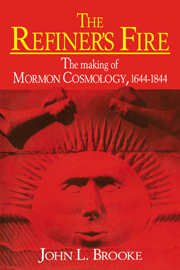Book contents
- Frontmatter
- Contents
- List of Illustrations
- List of Maps
- Preface
- Part I A Prepared People
- 1 Dreams of the Primal Adam
- 2 The True Spiritual Seed
- 3 Something of Our Ancestors
- Part II Hermetic Purity and Hermetic Danger
- Part III The Mormon Dispensation
- Appendix The Sectarian and Hermetic Circumstances of Mormon Origins in Vermont and New York
- Abbreviations Used in Notes
- Notes
- Index
3 - Something of Our Ancestors
Published online by Cambridge University Press: 30 October 2009
- Frontmatter
- Contents
- List of Illustrations
- List of Maps
- Preface
- Part I A Prepared People
- 1 Dreams of the Primal Adam
- 2 The True Spiritual Seed
- 3 Something of Our Ancestors
- Part II Hermetic Purity and Hermetic Danger
- Part III The Mormon Dispensation
- Appendix The Sectarian and Hermetic Circumstances of Mormon Origins in Vermont and New York
- Abbreviations Used in Notes
- Notes
- Index
Summary
Brother and Sisters, Cousins, Nephews and Nieces and all who are before me as such. I rejoice that I am connected with you, as there are three branches here, descendants of Father Phinehas, and Mother Susannah Goddard Howe. It might be interesting for me to speak as I am the oldest – I will communicate something of our ancestors to the Great Grand Children. Concerning my Great Grand Father Goddard I will give you a little history of his character as well as others of our ancestors, for some of you have to be baptized for some who are dead and worthy of it.
Elder John Haven, at a meeting of the Haven, Young, and Richards families, formerly of Hopkinton, Massachusetts, at Nauvoo, Illinois, January 8, 1845Historians long have agreed that the conditions of life in the turmoil of postrevolutionary America, both in the commercialfarming districts of the Burned-over District and in the hardscrabble midwestern frontier, explain the emergence of the Church of Jesus Christ of Latter-day Saints. In this interpretation, the appeal of a message of prophecy, restoration, and eventually divinization stemmed from the uniquely disordered conditions of the early-nineteenth-century frontier and of a rapidly democratizing society. People found refuge from a disordered world in the authoritative pronouncements of the prophet Joseph Smith.
Certainly, Mormonism was fundamentally shaped by the environment in which it emerged, and the particular circumstances of time and place must be kept clearly in view.
- Type
- Chapter
- Information
- The Refiner's FireThe Making of Mormon Cosmology, 1644–1844, pp. 59 - 88Publisher: Cambridge University PressPrint publication year: 1994
- 1
- Cited by



